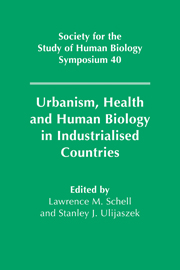Book contents
- Frontmatter
- Contents
- List of contributors
- Part I The urban environment
- Part II Epidemiology
- Part III Poverty and health
- Part IV Behavior and stress
- 12 Urbanism and psychosocial stress
- 13 Physical activity, lifestyle and health of urban populations
- 14 HIV transmission in urban environments: London and beyond
- Part V The future
- Index
12 - Urbanism and psychosocial stress
Published online by Cambridge University Press: 06 January 2010
- Frontmatter
- Contents
- List of contributors
- Part I The urban environment
- Part II Epidemiology
- Part III Poverty and health
- Part IV Behavior and stress
- 12 Urbanism and psychosocial stress
- 13 Physical activity, lifestyle and health of urban populations
- 14 HIV transmission in urban environments: London and beyond
- Part V The future
- Index
Summary
Editors' introduction
For centuries crowding and noise have been considered unpleasant stresses of urban life. Despite the long recognised connection between stress and urbanism, and the more recently revealed connections between stress and health, the role of urban stress in human biology and health is only now becoming clear. Pollard depicts the main methodological difficulties that have hindered the scientific study of stress and human biology: the great variety and number of potential stresses that could be investigated, and the difficulty of measuring human biological reactions without stimulating additional stress. Pollard shows that the former problem can be addressed with a biocultural approach that integrates “emic” cultural constructs of stress with “etic” biopsychological ones. The areas of greatest concern and investigation are work, home, neighborhood and travel in the city, with important cross-cutting themes of perceived control, and role balancing (i.e. domestic and occupational role balancing as performed by women). The development of new techniques to non-invasively measure stress-relevant hormones and neurotransmitters has greatly facilitated observation of physiological responses to stressors in these domains. Now the prospects are favorable for understanding the impact of daily hassles in urban life on physiological systems of interest to human biologists, and comparing measured relationships in different urban centres.
- Type
- Chapter
- Information
- Urbanism, Health and Human Biology in Industrialised Countries , pp. 231 - 249Publisher: Cambridge University PressPrint publication year: 1999
- 2
- Cited by



